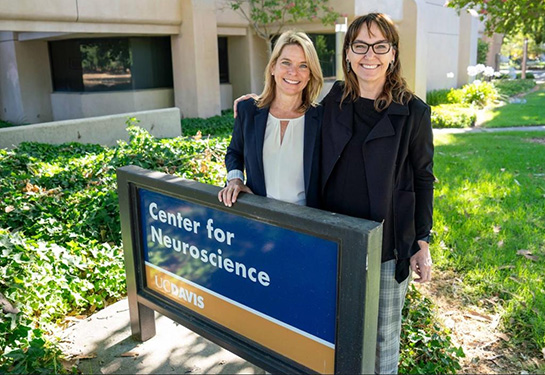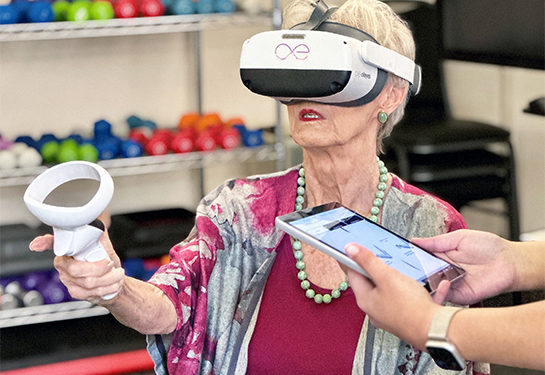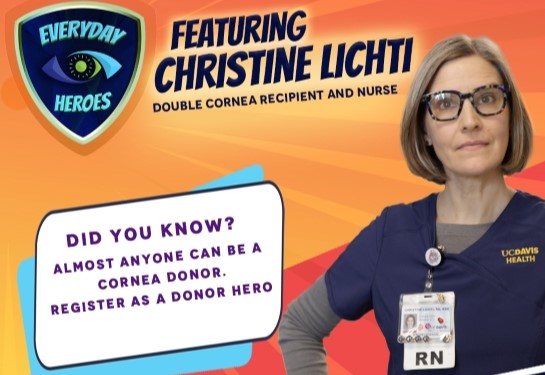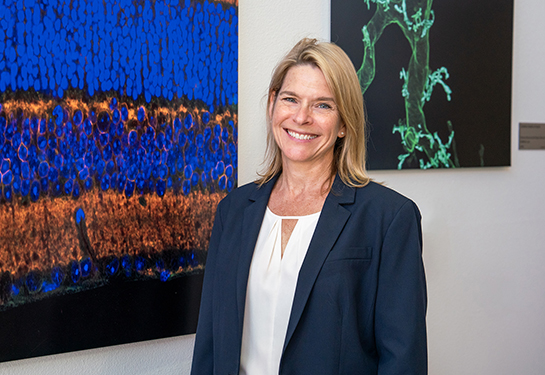Vision neuroscientist appointed interim director for Center for Neuroscience
Marie Burns is an accomplished vision scientist, leader and mentor
Marie Burns has been appointed interim director of the Center for Neuroscience (CNS), effective July 1, 2024. Burns is a professor in the departments of Ophthalmology and Vision Science and Cell Biology and Human Anatomy in the UC Davis School of Medicine.
Burns succeeds A. Kimberley McAllister, who served as the center’s director since 2016. McAllister is departing UC Davis to begin a new position as vice provost for research, scholarly inquiry and creative activity at Wake Forest University.
An accomplished vision scientist, leader and mentor
Burns is a highly respected and active member of the UC Davis neuroscience community, and a CNS core faculty member since 2001. She brings a wealth of leadership experience and a distinguished career in vision neuroscience research to her new role. Burns served as the inaugural director of the UC Davis Center for Vision Science from 2007 to 2012 and has been the director of the NIH Vision Science T32 Training Program since 2017.
“Marie’s dedication to mentoring trainees and fostering an inclusive, collaborative research environment has been a hallmark of her career at UC Davis,” said Mark Winey, dean of the College of Biological Sciences. “Her leadership acumen and longstanding commitment to advancing neuroscience research make Marie an excellent fit for this interim role.”
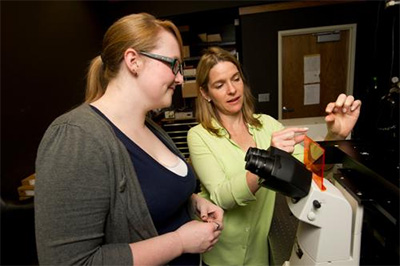
A third generation “eye doc,” Burns received her Ph.D. in neurobiology from Duke University and completed her postdoctoral training at Stanford University.
“I am motivated by personal connections, family members and friends affected by glaucoma and age-related macular degeneration,” Burns said. “I believe the work I do will directly impact the quality of care and treatment options within my parents' lifetimes."
Her research focuses on photoreceptors in the retina — the rods and cones in our eyes that detect light — in health and disease. The Burns Lab uses innovative approaches to study photoreceptor signaling and interactions between photoreceptors and the immune cells of the retina in vivo (in a living organism).
“Bridging a uniquely broad range of research topics and approaches, the Center for Neuroscience has been a national leader in multi-disciplinary neuroscience research for decades. I’m honored to step into the role of interim director during this transition," Burns said. "Together with the incredible faculty, trainees and staff at CNS, we will continue to advance the center’s mission, building on the strong foundation established over the past 30 years.”
A decade of dramatic growth, innovation and discovery
McAllister, who begins her appointment at Wake Forest this fall, is a cellular and molecular neuroscientist specializing in synapse biology and neuroimmunology.
She has dual appointments in the Department of Neurology in the School of Medicine and the Department of Neurobiology, Physiology and Behavior in the College of Biological Sciences.
Over nearly 25 years at UC Davis, McAllister has trained ten pre-doctoral and 13 post-doctoral fellows and more than 60 undergraduates and 13 postbaccalaureate students. She has been a CNS core faculty member since 2000.
From 2014 to 2016, McAllister served as the center’s associate director. In 2016, she became the first woman named director of the center. As director, McAllister oversaw significant growth in the center’s research funding, training programs and philanthropic support. She was pivotal in fostering collaborations and interdisciplinary initiatives within the broad neuroscience community across campus.
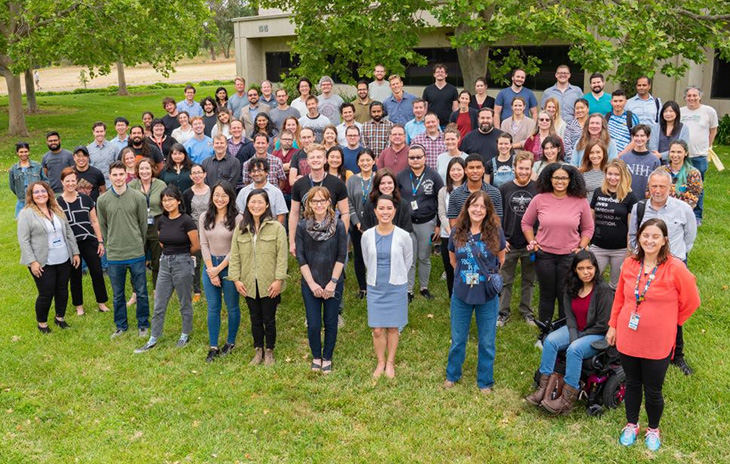
“Kim’s tenure as CNS director has been marked by numerous significant achievements and contributions to our community, and to the broader community of neuroscientists at UC Davis,” Winey said. “Her legacy, which is one of achievement and innovation, of collaborative, interdisciplinary partnerships across our campus, will be enduring.”
During her tenure as director, McAllister expanded three research areas critical to the future of neuroscience discoveries: computational neuroscience, systems neuroscience and the field of neuroengineering.
She also recruited seven CNS core faculty members and greatly expanded NeuroFest, the center’s annual outreach event held each March during Brain Awareness Week. This event, which welcomes hundreds of visitors each year, has strengthened the center’s mission of engaging the public in neuroscience research. McAllister was also instrumental in creating the CNS Director’s Circle, a special recognition program for donors who support ground-breaking research, outreach events and training fellowships at the center.
McAllister is also the founding director of the UC Davis Learning, Memory, and Plasticity (LaMP) T32 Training Program, Co-Director of the UC Davis Conte Center and Co-Champion of the Emerging Health Threats Grand Challenge.
“Serving as the director of the Center for Neuroscience for the past eight years has been one of the greatest honors of my life,” McAllister said. “I am immensely grateful for my UC Davis colleagues and proud of all we have accomplished together.”
About the Center for Neuroscience
Established in 1992, CNS is the interdisciplinary hub for neuroscience research and training at UC Davis. CNS faculty are leaders in cell/molecular, computational, cognitive, development and systems neuroscience and conduct cutting-edge research across a wide range of neuroscience approaches and subfields. We are committed to training the next generation of neuroscientists and engaging the public in neuroscience research. Our commitment to diversity, equity, and inclusion permeates and elevates every aspect of our community.
Media Resources
- Contact Kimberly Cummings, marketing and communications specialist, Center for Neuroscience, kpcummings@ucdavis.edu.

